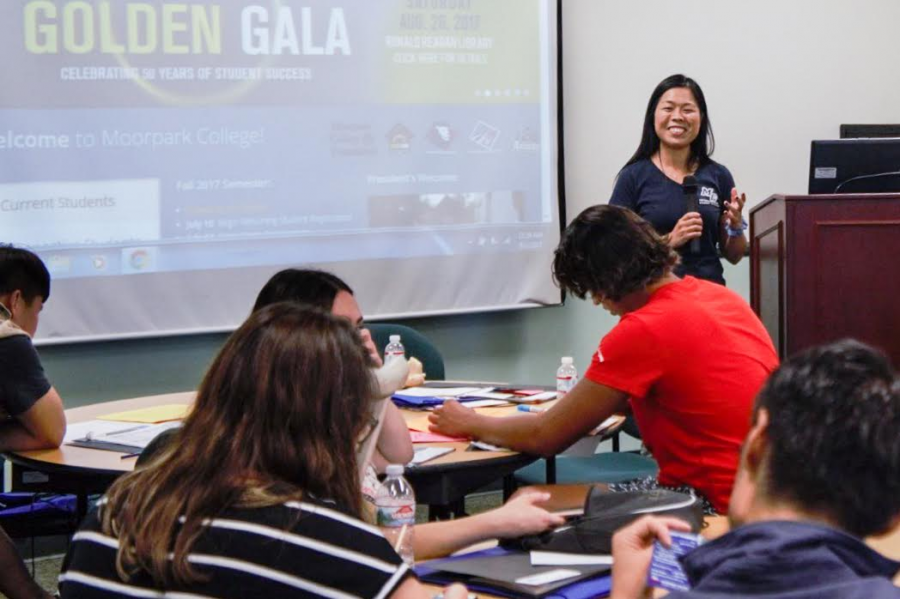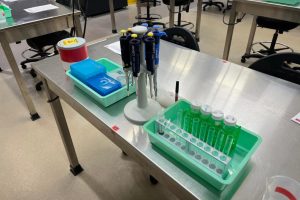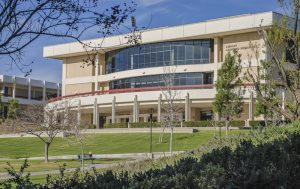Moorpark College welcomes new international students
Stacey Chen, International Student Program Coordinator, presents on how to find jobs and internships on campus. Much of the orientation focused on helping students get accustomed to living in the U.S.
August 22, 2017
The International Student Program welcomed its fall 2017 class early this August, as part of an all day orientation that included guest speakers and help for students who were new to the United States.
“In the start, I did struggle. It was really hard to integrate with the American way of life,” said international student mentor Areeb Rizvi, 21, biology major. “But luckily, Americans are really talkative, and they actually approached me and made friends with me. So they helped me settle down better. But if it wasn’t for them, I’d probably be struggling right now.”
The orientation, hosted by International Student Program Coordinator, Stacey Chen, featured an introduction to the college, advice on acclimating to the United States and a campus tour. Approximately 20 to 30 students came to the event, Ranging from Brazil, the United Kingdom and even from Australia.
“It’s to support international students in terms of meeting their needs as they come to the United States,” said Chen. “To go along with the philosophy of the school, it is to have the student in mind.”
Chen and Shannon Johnson, work experience coordinator, gave advice on scheduling for the semester, how to apply for on campus job positions and how to get internship credit, along with helping students understand important aspects of the American education system.
Many students at the orientation weren’t accustomed to the American style of education, and some weren’t familiar with U.S. mathematics, English language or even grade point average. After the orientation, however, many students were able to grasp the different concepts.
“[It’s helped me with] understanding a little bit more about the college system with the classes, because it’s really different from my country, “ said Paulina Fernandez, 23, a Film and Television student from Brazil.
When asked about why she chose to enroll at Moorpark College, Fernandez replied that the cost and the location, in the middle of Southern California, were some of the main factors.
“My agent, who happens to be my cousin too, has studied here in California, and he got in contact with the college here,” said Fernandez. “So I wanted to work as a set designer, and it was the first option he gave me, because of the price mostly, and the opportunity to transfer to a big university.”
Many of the international students find out about the college through friends or local language schools, according to Chen. In comparison to larger universities, she thinks Moorpark seems like a better choice for students new to the United States.
“Usually, what a lot of them hear of Moorpark College is word of mouth,” said Chen. “In terms of English proficiency level, our requirement is not as high as a four year university. So this is a good transitional phase for them.”
International students who had already attended Moorpark College spoke at the orientation as well, including Kouame Konan, former International Students Organization president, who came to the college from Cote D’ivoire. He spoke about the on-campus club, and attending school as an international student.
One of the key points discussed during the orientation was the hardships that students faced when entering the United States, and how Moorpark College helped them assimilate. While the average Moorpark student might not experience language barriers, culture shock, or issues with understanding the education system, international students often do, according to Chen.
The objectives of the orientation event, and the International Student Program as a whole, are to help students with these issues by providing services such as mentors, transfer advice, and help forming a sense of community.
At the end of the orientation, the students were assigned into groups under the leadership of mentors, who were international students themselves, but before the new students left for lunch and their tour, Professor of history and Academic Senate President Nenagh Brown, who came to the United States from the U.K., offered some words of encouragement.
“Make allies, make friends, introduce yourself, get out of your comfort zone,” said Brown. “We expect you to be loud and vocal, and to ask us for help.”








